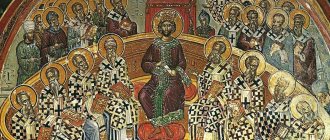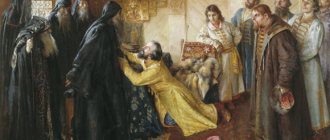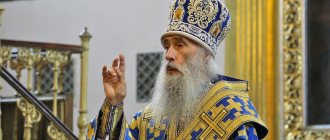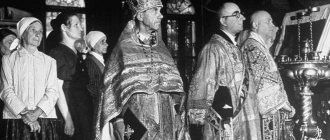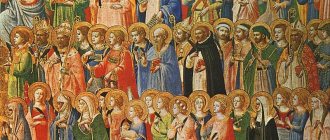An article by Pavel Kuzenkov, a candidate of historical sciences, a specialist in Church history and historical chronology, an associate professor at the Faculty of History of Moscow State University and the Sretensky Theological Academy, and a teacher at the Moscow Theological Academy, was published on the portal of the Department for External Church Relations.
We are all familiar with the full title of the primate of the first Local Orthodox Church in the diptych: “Archbishop of Constantinople - New Rome and Ecumenical Patriarch.”
It would seem that everyone understands that the word “Ecumenical” here is nothing more than a pompous Byzantine title, a tribute to ancient tradition. After all, Orthodox teaching does not allow anyone - except Christ Himself - “worldwide jurisdiction”: just as the apostles, in fraternal unanimity, but independently and independently carried out their God-ordained mission, so the Local Churches founded by them are sisters, united in the Holy Spirit as parts of the one Holy Catholic and Apostolic Church. But people who are far from the intricacies of canon law and who are not familiar with church history perceive this formula completely differently. In their view, based on the basic meaning of the word “universe,” this title looks like official recognition of the role of the leader of world Orthodoxy for the first of the Patriarchs. And this despite the fact that his flock worldwide numbers about 6 million people[1] - approximately 2% of the total number of Orthodox Christians[2]. What does the title “Ecumenical” mean, where did it come from and what is its real purpose?
Empire as a Universe
First of all, it is necessary to understand the word “universe” itself - in Greek οἰκουμένη. This is a passive participle from the verb οἰκέω “to live, inhabit, inhabit” with the usually omitted noun “earth”, that is, literally “earthly space inhabited by man.” This is what the ancient Greeks called the world they knew, in contrast to distant regions that were either uninhabited or inhabited by wild barbarians. Usually, the “universe” was not understood as the whole world, but only that part of it where civilization existed. The rulers of large kingdoms were called “kings of the universe,” such as Cyrus of Persia in the Bible (2 Esdras 2:2). And when the Greco-Roman civilization was united under the rule of the Roman emperors, the “universe” began to be called the Roman Empire. It is in this sense that St. uses this word. Apostle Luke, when he talks about the Nativity of Christ: “Now it came to pass in the days of thee, and when Caesar Augustus commanded that the whole universe should be written” (πᾶσαν τὴν οἰκουμένη ν - Luke 2:1). The term “ecumene” meant not so much an inhabited, but rather a cultivated space of ancient civilization. Other cultures had their own “universes” - and this understanding persisted for centuries. For example, when in 1262 the Bulgarian ruler Jacob Svyatoslav sent a list of the Helmsman’s Book to Metropolitan of All Rus' Kirill II, he wrote: “May the Russian universe be enlightened by your word” - “May the Russian universe be enlightened by your word!”
When the holy Equal-to-the-Apostles Emperor Constantine the Great convened bishops from all over his Empire in Nicaea in 325 to discuss general church problems, this meeting was called the “Ecumenical Council.” Thus was born an institution at the all-imperial level, at which, at the call of the emperors, on especially important occasions, bishops from all over the vast Roman state gathered - under the chairmanship of the most authoritative bishops, who over time began to be called “chiefs of the fathers” - Patriarchs.
The epithet “ecumenical” in the sense of “empire-wide, state-wide” became especially widespread in the legislation of Justinian the Great (527-565). In its laws the words “universe, universal” are constantly found as an indication of the entire territory of the Empire. And in the 109th novella of 541, the emperor gives a comprehensive explanation of the highest church institutions - Ecumenical Councils and Patriarchates: “The fathers also called heretics, and we call those who belong to various heresies ... and in general all who are not members of the Holy Catholic Church of God and the Apostolic Church, in which all the most holy Patriarchs of the entire Universe - and Western Rome, and this royal city, and Alexandria, and Teupol (Antioch - P.K.), and Jerusalem, and all the most reverend bishops subordinate to them - unanimously proclaim the Apostolic Faith and legend"[3].
So, from the point of view of imperial legislation, the Orthodox faith is proclaimed in agreement by the five “Patriarchs of the Universe” and the bishops subordinate to them - and it is to testify to this agreement that the Ecumenical Councils are assembled by the emperors. The order of veneration of the Patriarchs is determined by the canons (2 Ecum. 3; 4 Ecum. 28; Trul. 36) and enshrined in the laws of the Roman Empire (Codex Iustiniani, I.1.7, I.2.16; Novella Iustiniani 131, etc.): Rome - Constantinople - Alexandria - Antioch - Jerusalem. It is important to note that this list of the five patriarchal thrones by no means exhausts the number of autocephalous Local Churches: outside its framework are not only the Orthodox Churches that were located outside the Empire at that time (Georgian, Aquileian), but also independent Churches within its borders (Cyprus, Carthaginian , Justinian the First). The Pentarchy, according to Justinian, symbolized the unity of the Orthodox Church, the guarantors of which were the primates of the most authoritative episcopal thrones of the Empire.
And, most importantly, all five Patriarchs were considered “Ecumenical”.
Patriarch: first among fathers
Estimated reading time: 3 minutes.
If an ordinary person is asked who the Patriarch is, he will very likely answer that the Patriarch is the head of the Church. Indeed, we often, for example, hear in the news about His Holiness Patriarch Kirill that “the head of the Russian Orthodox Church did this or that.”
However, such word usage cannot be considered flawless. Indeed, in the proper sense, the Head of the Church, which is the Body of Christ, is only the Savior himself. The Apostle Paul says that “the husband is the head of the wife, just as Christ is the head of the Church” (Eph 5:23). The Church was directly founded by God himself, and the only Head of the Universal Church is Jesus Christ.
However, in Orthodoxy, the Universal Church, in a certain sense, consists of Local Churches. Today, there are only fifteen of them, which are completely independent and self-governing, and eight of them are Patriarchates (i.e., they are headed by Patriarchs): Constantinople (Turkey), Alexandria (Egypt), Antioch (Syria), Jerusalem, Moscow, Georgian, Serbian, Romanian and Bulgarian.
In Orthodoxy, the patriarch is the supreme hierarch who administers the Local Church entrusted to him together with the Holy Synod. And the fact that he does not rule in his government like a sole monarch is expressed in the ancient Greek word ὁ πατριάρχης (patriarhēs). It is formed from the words ὁ πατήρ (patēr) - father, and ἡ αρχή (arhē) - power. The word “Patriarch” can be translated into Russian, firstly, as ancestor or forefather. And, secondly, this word can also be translated as “head of the fathers” or even as “first among the fathers,” since ἡ αρχή is not only power, but also the beginning.
The patriarch in Orthodoxy is not some kind of highest degree of priesthood. He is not the bearer of the highest sacred authority in the Local Church, to which She must unconditionally submit. It is rather an honorary title, which marks the first among bishops.
Thus, the Patriarch in the Orthodox Church cannot, like the Pope in the Catholic Church, be the final and decisive authority on any dogmatic and moral issues. The 1992 Catechism of the Catholic Church states in paragraph 882 that “The Roman Pontiff has over the Church, by virtue of his office as Vicar of Christ and Shepherd of the whole Church, full sovereign and universal power, which he has the right to freely exercise at all times.” And even the Ecumenical Council among Roman Catholics is considered such only if the pope convened it and approved its decisions.
At the same time, for example, in relation to the Patriarch of Moscow and All Rus', the Charter of our Church actually does not even use the word “head”. The Patriarch there is called the Primate of the Russian Orthodox Church, who “has primacy of honor among bishops and is accountable to the Local and Bishops’ Councils.” The highest bodies of church authority according to the Charter are the Local Council, the Council of Bishops and the Holy Synod, headed by the Patriarch. And it is the Local Council that has the highest authority in the field of doctrine, church administration and church court.
This structure of church government expresses that the Roman Catholic Church is more reminiscent of an absolute monarchy, while for the Orthodox Church the conciliar principle is decisive. It is in the Ecumenical Council that Orthodoxy sees the highest authority of the earthly Church.
Finally, we note that Patriarchs are also called the pious ancestors of the Jewish people, who were Old Testament saints. God first gave them Revelation, made a Covenant with them and promised a Savior. That is, this word is used in relation to Abraham, Isaac, Jacob and his 12 sons. Therefore, the God of Revelation is called in the Bible “the God of the fathers” (Ex. 3:13; Deut. 4:37; 12:1; Judges 2:12; 4, etc.), and the God of “Abraham, Isaac and Jacob.”
On the screensaver there is a fragment of the photo https://www. patriarchia. ru
From five “Patriarchs of the Universe” to one “Ecumenical Patriarch”
In the sources that have come down to us, the epithet “ecumenical” as applied to a bishop is first found in the acts of the so-called. Council of the Robbers in Ephesus 449: Bishop Olympius of Evaz in his speech titled the leader of this scandalous false council, Dioscorus of Alexandria, “our most holy father and ecumenical archbishop of the great city of Alexandria”[4]. Two years later, at the Council of Chalcedon, the legates of Pope Leo the Great signed on behalf of “our lord, the most blessed apostolic man of the universal church, bishop of the city of Rome”[5].
But only in the laws of Justinian (from 530) the formula “Ecumenical Patriarch” begins to be officially applied to the archbishops of Constantinople - New Rome[6]. This innovation was not immediately noticed outside Byzantium, and when it was noticed, it immediately caused an angry rebuke from the Roman throne. St. Pope Gregory I saw in the word “ecumenical” Constantinople’s claims to dominance in the Church - about which he wrote with bitterness to Eulogius of Alexandria[7]. In response, Eulogius, and even the then Patriarch of Constantinople himself, assured the pope that this was nothing more than a pompous ceremonial title. And that, of course, the true leader of Christians around the world is he, the Primate of the Apostolic Throne...
The understanding that all patriarchal thrones are ecumenical was preserved in Byzantium for centuries. Thus, at the VII Ecumenical Council, the representative of the Patriarch of Jerusalem, John, called the most holy Patriarchs “shepherds of the universe”[8]. And St. Theophan the Confessor (†818) in the preface to his famous “Chronography” writes that he will indicate the years of “the bishops of the great and ecumenical thrones - namely, Rome, Constantinople, Alexandria, Antioch and Jerusalem, both those who preserved the Church Orthodoxy and who ruled in heresy in a robber manner”[9].
It is characteristic that in the 9th century. to a direct question about the meaning of the title “Ecumenical”, which was asked in Constantinople by the papal envoy Anastasius the Librarian, he was answered that the patriarch is called ecumenical (oecumenicus, universalis) not because he is supposedly a bishop over the whole world, but because he has a superior power over one of the parts of the world inhabited by Christians[10].
Subsequently, the Byzantine canonists Theodore Balsamon (XI century) and Matthew Blastar (XIV century) emphasized that the “areas of the four climates of the universe” are distributed among the five Patriarchs, not counting the “small Churches” that are not subordinate to any of the Patriarchs: Bulgarian, Cypriot , Georgian. And none of the Patriarchs “is allowed to either send a stauropegian to a country that is subordinate to another Patriarch, or take a cleric from it, so that the rights of the Churches are not violated”[11].
But, despite all this, the idea of special, unique prerogatives of Constantinople appears in imperial legislation and Byzantine nomocanons. For example, in the Nomocanon of the XIV titles as amended in 880, we read (title I, chapter 5): “On the rank of Patriarchs ... and that the head of all churches is Constantinople, read the 1st book of the Code, title 1, section 7 ; title 2, sections 6, 20 and 24; and also the 1st title of Novella, section 2, and title 2, section 3. And the 16th section of the 2nd title of the 1st book [of the Code] says that Constantinople has the presidency over all.”[12] This text is echoed by the “Isagoge” of Emperor Basil I (886), which says: “The throne of Constantinople, adorned with the kingdom, was declared the first by conciliar decisions; following them, divine laws prescribe that litigation that occurs in other thrones be transferred to his consideration and judgment” [13]. It is characteristic that none of the texts listed in the Nomocanon speaks of Constantinople as the “head of all churches” and none of the laws prescribes the worldwide jurisdiction of the See of Constantinople. But if we talk about the territory of the Empire itself, then in this case the statements of Nomocanon and “Isagoge” are true.
The fact is that by the 9th century, Byzantium had lost all its possessions in the east and west, and its borders actually coincided with the area of canonical jurisdiction of the Patriarchate of Constantinople. And since the scope of legislative codes is, by definition, limited to the territory of the Empire, the prerogatives of Constantinople outlined there are limited to the same territory. And this perfectly corresponds to his title “Ecumenical” - where by “universe”, as usual, is meant the Roman (Byzantine) Empire.
